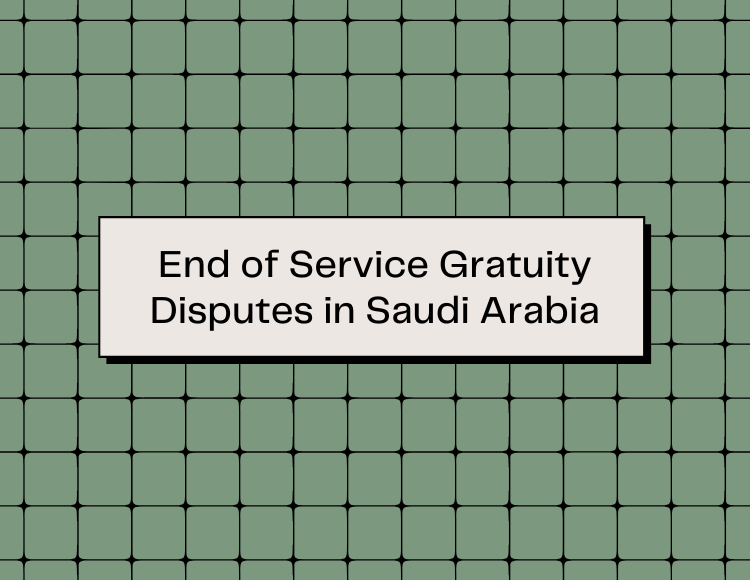Picture this: You’ve worked hard for years in Saudi Arabia—maybe as an engineer in Riyadh or a teacher in Jeddah. Your job ends, and you expect a big payout—your end-of-service gratuity—as a reward for all your effort. But instead of getting your money smoothly, you face delays, arguments, or even a smaller amount than you deserve. Does this sound like your story? You’re not the only one. Gratuity disputes are becoming a big issue in Saudi Arabia, especially with so many local and expat workers.
Saudi Gratuity After 10 Years of Service: What to Expect
In this article, we’ll explore gratuity problems in detail—what they are, why they happen, and how you can fix them. Whether you’re an employee fighting for your rights or an employer trying to follow the rules, we’ll guide you step-by-step. Let’s make it simple and share real-life tips you can use.
What Is End-of-Service Gratuity in Saudi Arabia?
So, what’s this end-of-service gratuity all about? In Saudi Arabia, it’s money employers must pay workers when their job ends. Think of it as a “thank you” for your hard work. The Saudi Labor Law—specifically Articles 84, 85, and 87—sets the rules for this payment, often called EOSG.
Here’s the simple breakdown:
- Who Gets It? You qualify if you’ve worked at least two years and resign, or one year if your employer ends your job.
- How Do You Calculate It? For the first five years, you earn half a month’s salary per year. After five years, you get a full month’s salary per year. “Salary” usually means your basic pay, sometimes with extras like housing.
- When Do You Get It? Your employer pays within one week if they fire you, or two weeks if you quit.
Easy enough, right? Not always. Trouble starts when employers don’t follow these rules or when people get confused. Let’s look at the main gratuity issues workers face.
Expat Gratuity Rights in Saudi Arabia: Resignation vs. Termination
Common Gratuity Disputes in Saudi Arabia
Gratuity disputes aren’t just random fights—they happen in predictable ways. Workers and experts often point to these five big problems:
- Wrong Gratuity Calculations
- What Goes Wrong: Employers use the wrong salary (like leaving out allowances) or count your years incorrectly. For example, you work 7 years, but they pay you for 5. That’s a big loss!
- Real Story: Ahmed, an expat mechanic, thought he’d get 45,000 SAR after 7 years at 10,000 SAR/month. His employer gave him 25,000 SAR, saying the last 2 years “didn’t count” because of a contract renewal.
- Late Payments
- What Goes Wrong: The law says you get your money in 7-14 days. But some employers wait, blaming cash problems or “waiting for approval.”
- Real Story: Maria, a nurse from the Philippines, waited 3 months for her gratuity after leaving her job in Dammam. She had to borrow cash to get by.
- No Payment or Less Payment
- What Goes Wrong: Some employers refuse to pay or cut your money for reasons like “company losses.” That’s against the law, but it still happens.
- Real Story: Faisal, a Saudi salesman, worked 10 years. His employer said he lost his gratuity because he didn’t give 60 days’ notice—even though the law says he’s still owed it.
- Resignation vs. Termination Arguments
- What Goes Wrong: If you quit, you get less gratuity (like one-third for 2-5 years). Some employers say you “quit” even if they forced you out, cutting your payout.
- Real Story: Priya, an Indian teacher, had to resign when her school downsized. They paid her one-third instead of the full amount she deserved for being let go.
- Confusing Contract Rules
- What Goes Wrong: Contracts can be fixed-term or unlimited, and this affects your gratuity. Employers sometimes twist unclear terms to pay less.
- Real Story: Omar’s 1-year contract renewed twice. After 3 years, his employer called it “fixed-term” and paid him less than he’d get with an unlimited contract.
These gratuity issues don’t just hurt your wallet—they can ruin the good feelings from years of work. So, why do these problems keep popping up?
Why Do Gratuity Disputes Happen?
Gratuity disputes don’t come out of nowhere. They happen because of a few common reasons:
- Not Knowing the Rules: Many workers, especially expats, don’t understand their rights under Saudi Labor Law. Some employers don’t know either—or they hope you won’t notice.
- Messy Records: If your employer doesn’t track your years, pay raises, or leave properly, mistakes happen.
- Money Troubles: Companies sometimes hold back payments to save cash, especially when business is slow.
- Workplace Habits: In Saudi Arabia, people often avoid arguing with bosses because of respect or fear. This lets problems grow.
- Unclear Laws: The rules aren’t always simple—like what counts as “basic salary”—so employers and workers disagree.
Now that we’ve covered the “what” and “why” of gratuity disputes, let’s move to the best part: how to solve them.
How to Resolve Gratuity Disputes: A Step-by-Step Guide
Dealing with a gratuity dispute might feel scary, but you can handle it. Here’s an easy guide to fix things:
Step 1: Know What You’re Owed
- What to Do: Collect your contract, payslips, and any job-ending papers. Figure out your gratuity with this formula:
- First 5 years: (Basic Salary ÷ 2) × Years
- After 5 years: Basic Salary × Years
- If you quit: Adjust it (1/3 for 2-5 years, 2/3 for 5-10 years, full for 10+ years).
- Example: 7 years at 10,000 SAR/month = (5 × 5,000) + (2 × 10,000) = 45,000 SAR.
Step 2: Talk to Your Employer
- What to Do: Meet HR or your boss nicely. Show them your numbers and ask why theirs are different. Use email or a letter to keep it official.
- Tip: Write down everything. If they say, “We’ll check,” ask for it in writing.
Step 3: Complain to the Labor Office
- What to Do: If your employer won’t budge, contact the Ministry of Human Resources and Social Development (MHRSD). File online or visit their office with:
- Your passport or Iqama
- Your contract
- Payslips
- Proof of how your job ended
- How It Works: They talk to both sides and make sure the law is followed.
Step 4: Go to Labor Court
- What to Do: If the labor office doesn’t fix it, take your case to the Labor Court. A lawyer can help, but many people do it alone with the right papers.
- Timeline: Courts try to finish fast—often in a few months—but stay patient.
Step 5: Get Extra Help
- What to Do: Hire a Saudi labor lawyer or ask your embassy (if you’re an expat). Some jobs have groups that support workers too.
- Cost: Lawyers charge different rates, but a first meeting might cost 500-1000 SAR.
Extra Tip: Use Online Tools
- Websites like endofservicecalculator.com let you check your gratuity. They’re not official, but they give you a good idea.
Tips to Avoid Gratuity Disputes
It’s better to stop problems before they start. Here’s how:
- For Workers:
- Read your contract before you sign.
- Save your payslips and track your work years.
- Ask HR what you’ll get before you leave.
- For Employers:
- Teach HR the Saudi Labor Law.
- Use software to manage gratuity payments.
- Tell workers clearly how you calculated their money.
What Happens If You Ignore Disputes?
Letting a gratuity dispute sit doesn’t make it go away. Workers lose cash and feel stressed. Employers face bigger trouble—fines, court fights, and a bad name. The MHRSD can charge thousands of SAR in penalties and make you pay what’s owed plus extra.
Conclusion: Know Your Rights, Take Action
End-of-service gratuity disputes in Saudi Arabia don’t have to ruin your day. Whether it’s a wrong amount, a late payment, or no money at all, you can fight back. The Saudi Labor Law protects you, and a little effort can get you what you deserve. Employers can avoid headaches by doing things right from the start.
Next time your job in Saudi Arabia ends, don’t just cross your fingers—plan ahead. Check your gratuity, talk to your employer, and step up if you need to. Have you dealt with a gratuity dispute? Tell me your story below—I’d love to know how you fixed it!

